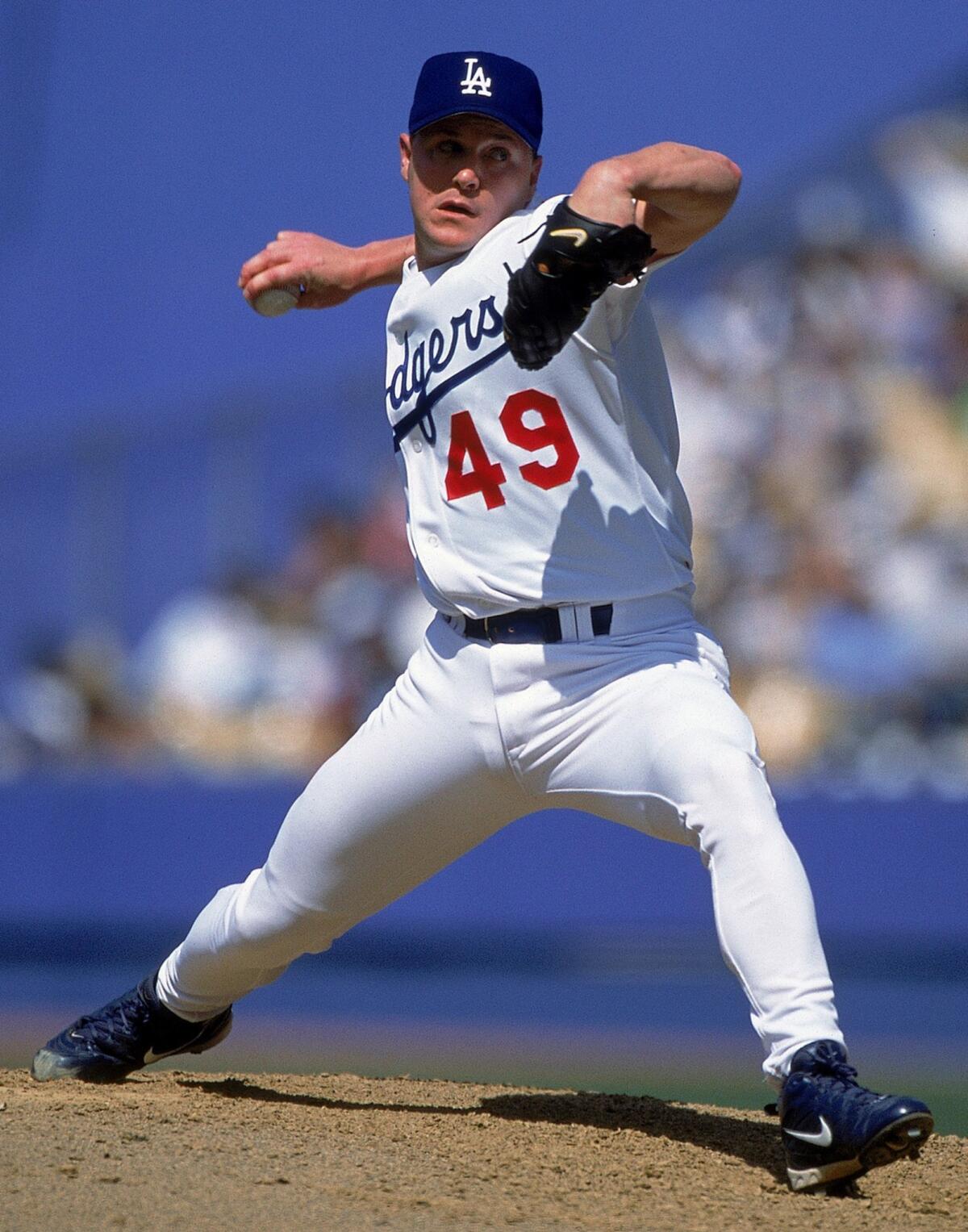Matt Herges relieved that he came clean about being a drug cheat

- Share via
When Matt Herges was outed as a drug cheat six years ago, he could have done what Ryan Braun did. He could have denied it to the media, lied about it to his teammates and blamed others for his actions.
Or he could have done what Alex Rodriguez did: hire a team of lawyers and order them to explore every option short of telling the truth.
Instead Herges stood up, confessed, then apologized.
“The day I did it, although it hurt, it was an unbelievable relief,” he says. “I never slept better. I was exposed and that’s what I needed.”
Now what he needs, he says, is to make amends. Which is why he’s spent the last two summers sitting through the long bus rides and longer games that define the life of a minor league pitching coach, all in an effort to stop others from making the same mistake he did.
“It’s not like I go around with a sign on my back saying, ‘Hey, I did steroids,’” says Herges, 43, who is in his second season with Rancho Cucamonga, the Dodgers’ affiliate in the single-A California League. “But I’m an open book with that. It’s an immediate ‘Don’t do what I did. Don’t take that road.’
“First of all, you’ll get caught. And second of all, do it the right way. Ninety percent of my career in the major leagues was clean. So you can do it without it.”
Herges was a grinder who clawed his way to an 11-year major league career and a World Series appearance with the Colorado Rockies.
Undrafted out of college, he signed with the Dodgers as a free agent and struggled in his first three years in the low minors, losing more games than he won. So when a shortcut to the majors presented itself before the start of his fourth season he took it, shunning the union and reporting to spring training as a replacement player, ready to take the place of a striking big leaguer.
That decision got him barred from the union for the rest of his career, costing him tens of thousands of dollars in revenue shared by the players from the sale of shirts, video games and other licensed merchandise.
“There was a time where I literally would have done anything to make it to the big leagues. Just one day,” Herges remembers. “I don’t regret wanting that. Obviously, that’s every kid’s heart who wants to play in the big leagues.”
The next shortcut would prove even costlier.
Herges doesn’t remember exactly when he started taking steroids, but in 2000, his first full season in the majors, he went 11-3 with a 3.17 ERA for the Dodgers. A year later he appeared in a career-high 75 games, winning nine and striking out 76 in 991/3 innings.
“Did it help my performance? I can’t deny that,” Herges says. “It does.”
By 2007, Herges had proved to be a workhorse for the Expos, Padres, Giants, Diamondbacks, Marlins and Rockies, capping that run with two innings of perfect relief to win the deciding game of the National League Championship Series.
Two months later his secret was blown when his name appeared in the Mitchell Report, the product of a 21-month investigation into the use of performance-enhancing drugs in baseball. That forced Herges, who defines himself as a “Christ follower,” to search his soul and his faith.
“A lot of times you don’t want to dig deep. But I did. And I didn’t like what I found,” he says. “What I found really was what I had probably known my whole life: That I’m an unbelievably selfish person.”
Hours before the Mitchell Report went public, he told his family about his drug use for the first time.
“The hardest part was telling my wife because she had no idea,” Herges says. “She had even, at times I’m sure, defended me, not knowing. And her response was ‘OK. What else is there? If you can hide this from me, your wife, what else is there?’”
Nearly six years later, Herges hasn’t finished confessing. Last week he called a reporter and openly discussed his steroid use with his three kids, ages 7 to 10, in the car with him.
“I have been wondering when would be a good time, when they’re mature enough to even hear this, to process it,” Herges says. “I think my oldest is ready. And I know he’s listening right now. There’ll be a conversation about this when I hang up.
“He needs to know his dad is fallible. And it’s OK.”
If Herges were able to have a conversation with Braun, Rodriguez or any of the players expected to be suspended this week for allegedly using PEDs, he says he would tell them the same thing: You’re fallible. And it’s OK.
“I’ve been there. I’ve seen my name scroll across the bottom” of the TV screen, he says. “Just admit it and people will forgive. When we continue to deny and run from it, that’s when you get chased.
“I think people just want you to say ‘I blew it, I did it.’ And then you can move on from there.”
Twitter: @kbaxter11
More to Read
Go beyond the scoreboard
Get the latest on L.A.'s teams in the daily Sports Report newsletter.
You may occasionally receive promotional content from the Los Angeles Times.










